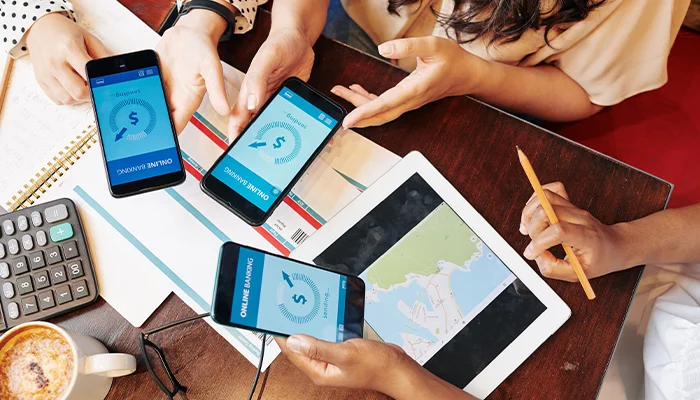
10 App Personalization Tips to Increase Customer Engagement in 2025
December 27,
2:05 PM
App personalization is a powerful tool for increasing customer engagement. In 2025, users expect apps that are tailored just for them. Personalization makes apps feel more relevant, which keeps users happy and coming back. PerfectionGeeks, a leading app development company, understands the importance of this. Here are 10 tips for personalizing your app and boosting user engagement.
What is App Personalization?
App personalization means adjusting the app to meet the specific needs of each user. It uses data to display content, products, or features that match the user's behavior. This makes the app feel personal, which encourages users to engage more often.
In short, personalization means creating an experience that feels unique to each user.
Why is App Personalization Important?
Personalizing your app can have big benefits:
Better User Experience: A personalized app is easier and more enjoyable to use.
Higher Engagement: When users feel understood, they interact with the app more.
Better Retention: Personalized apps encourage users to return.
More Conversions: Personalized recommendations lead to more actions like purchases.
Let’s explore 10 tips to help you personalize your app and boost user engagement.
1. Offer Personalized Recommendations
Recommendations are a great way to keep users engaged. Use data from their past actions to suggest products, content, or services they will like.
For example, if someone frequently buys workout gear, suggest related items. Or if they listen to certain music genres, recommend new songs in that style. This helps users discover more of what they love.
2. Send Personalized Push Notifications
Push notifications are a great way to bring users back to your app. But don’t just send general messages. Make the notifications relevant to each user.
For instance, remind users about an item left in their cart or suggest content that matches their preferences. Personal notifications are more likely to get clicked, which boosts engagement.
3. Show Dynamic Content Based on User Actions
Dynamic content adjusts to what the user is doing. For example, if a user watches a fitness video, show other related workout videos. Or if they read a certain type of article, suggest similar ones.
This keeps the content fresh and relevant, which encourages users to stay engaged.
4. Allow Users to Customize the App
Let users make the app feel more personal by offering customization options. For example, let them change the app’s theme, choose which content they want to see, or set up preferences.
If users can shape their experience, they’ll feel more connected to the app, which leads to better engagement.
5. Use AI to Improve Personalization
AI helps take personalization to the next level. It learns from user behavior and automatically adjusts the app to fit their needs.
For example, AI can suggest products based on a user’s past browsing or purchases. As users interact more with the app, the AI gets smarter, making the experience even more personalized.
6. Segment Users for Better Content
Grouping users based on similar interests or behaviors allows you to send the right content to the right person.
For example, a fitness app can offer beginner workout plans to new users and advanced plans to experienced users. This helps ensure that users see the most relevant content, which increases engagement.
7. Personalize Content Based on Location
Location data can be used to deliver more relevant content. For instance, a restaurant delivery app can show nearby food options, while a travel app can suggest local attractions.
This makes the app more useful and personalized, increasing user satisfaction.
8. Add Gamification Features
Gamification adds fun elements, such as rewards, challenges, or points. This motivates users to interact more with the app.
For example, a fitness app can reward users with points for completing workouts or reaching goals. These rewards encourage users to keep using the app, boosting engagement.
9. Use Chatbots for Instant Support
Chatbots offer quick, personalized help to users. They can suggest products, provide answers, or guide users through the app.
For example, an e-commerce chatbot can recommend products based on the user’s interests. Chatbots make the app feel more responsive and user-friendly, which keeps users engaged.
10. Integrate Social Media Features
Integrating social media features makes the app feel more connected to the user’s world. Let users share content, see what their friends are doing, or get recommendations based on social activity.
For instance, a fashion app can suggest clothes based on what a user’s friends are wearing. A music app can recommend songs based on trends within the user’s social circle.
Conclusion: The Future of App Personalization
Personalization will continue to be a key factor for app success in 2025 and beyond. By following these 10 tips, you can create an app that offers an engaging, customized experience. PerfectionGeeks understands that the future of mobile apps is about personalizing the user experience. By using data and smart design, you can create an app that users love and keep coming back to.
Start applying these tips today and take your app’s engagement to the next level.




Blockchain Solution
Launching
- Market Research & Analysis
- Strategic Planning
- Branding
- Content Creation
- Social Media Marketing
- Analytics and Reporting
Testing
- Unit Testing
- Integration Testing
- Smoke Testing
- Security Testing
- Recovery Testing
- System Testing
- Regression Testing
- Performance and Load Testing
- UAT User Acceptance Testing
Maintenance
- Security Updates
- Performance Optimization
- Database Management
- Monitoring & Reporting End-of-Life Planning
Contact US!
Copyright © 2025 PerfectionGeeks Technologies | All Rights Reserved | Policy





